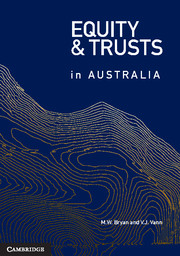Book contents
- Frontmatter
- Contents
- Preface
- Table of Cases
- Table of Statutes
- Abbreviations
- Part A Introduction
- 1 An Overview Of Equity
- Part B Equitable Remedies
- Part C Equity, Contract and Property
- Part D Equitable Obligations
- Part E Express Trusts
- Part F Performing the Trust
- Part G Breach of Trust
- Part H Non-Consensual Trusts
- Index
- References
1 - An Overview Of Equity
from Part A - Introduction
- Frontmatter
- Contents
- Preface
- Table of Cases
- Table of Statutes
- Abbreviations
- Part A Introduction
- 1 An Overview Of Equity
- Part B Equitable Remedies
- Part C Equity, Contract and Property
- Part D Equitable Obligations
- Part E Express Trusts
- Part F Performing the Trust
- Part G Breach of Trust
- Part H Non-Consensual Trusts
- Index
- References
Summary
What is equity?
The word ‘equity’ is one of the most ambiguous in the law. Its most obvious meaning is fairness and justice. Many would argue that equity is the overriding goal of all law. How could the law ever justify unfair or inequitable outcomes? But a moment's thought will show that applying, without more, the criterion of ‘fairness’ to solve all legal problems is open to serious objections. Decisions will inevitably reflect the subjective beliefs and values of the adjudicator as to what is fair. In a pluralist democracy disputes about what is fair or equitable are settled by elected legislators, not by unelected judges, except where legislation has explicitly authorised judges to determine cases by reference to considerations of fairness. Judges do not assess what is equitable without reference to some standard or benchmark.
Secondly, equity sometimes refers to the principles applied by judges where the law is deficient for some reason. Aristotle is the first recorded writer to define ‘equity’ in these terms. In Nicomachean Ethics, Aristotle contrasted law, which was said to be ‘universal’ in its application, with equity which was seen as ‘a correction of law where it was defective owing to its universality’. We might nowadays query the assumption that legal rules are invariably of universal application. Moreover, the preferable response in a democratic society to a legal rule that cannot do justice in an individual case is to invite the legislature to reform the law. But Aristotle anticipated the lawyer's idea of equity in two respects. First, equity corrects, or supplements, the law but does not replace it. The fact that equity modifies the application of the law in specific instances does not impair the legitimacy of the law in those cases where there is no need of equity. Secondly, some equitable doctrines can be explained in terms of the dilemma of ‘universality’ in the law: a soundly based legal rule of general application can on occasions be exploited for improper purposes. For example, where the law requires some contracts to be in writing equity can modify the writing requirement where its application would cause injustice.
- Type
- Chapter
- Information
- Equity and Trusts in Australia , pp. 2 - 22Publisher: Cambridge University PressPrint publication year: 2012



